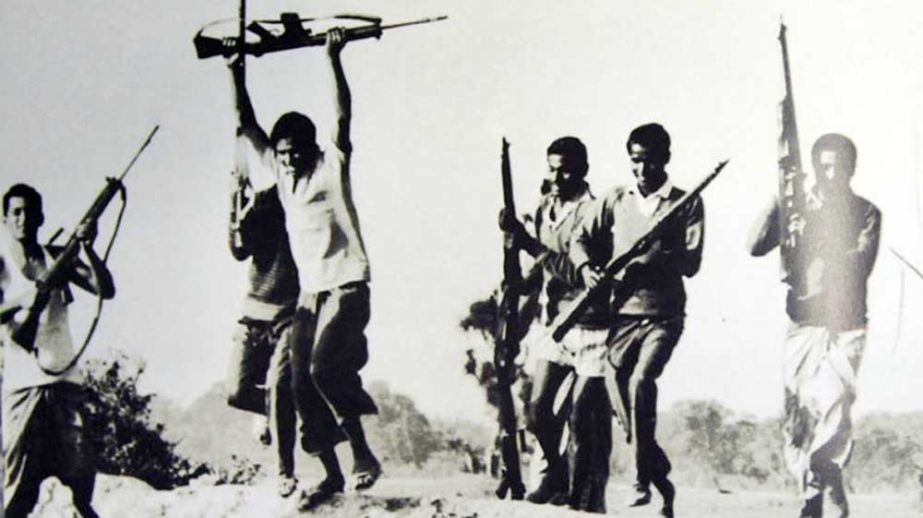
A. T. M. Nurun Nabi :
Iktiaruddin Muhammad Baktiar Khilji established Muslim rule in Bengal early 13th century, while Haji Ilyas, better known as Shamsuddin Ilyas Shah was the founder of the Sultanate of Bengal and its inaugural Ilyas Shahi dynasty, which ruled the region from 1342 to 1487 A.D. But, Bengal lost its sovereignty with the defeat of Nawab Sirajuddowlah to a small British Army.
However, independence was regained in December 1971 after nine months’ People’s war led by the Architect of Bangladesh Bangabandhu Sheikh Mujibur Rahman, though he was not physically present in the battle field. His 7th March Speech guided the war, to be called people’s War.”
From the history of independence, the names of Swadhin Bangla Nucleus, East Pakistan Students League and Sirajul Alam Khan cannot be omitted. The role of Sirajul Alam Khan is unforgettable.
Bengal Muslim League leaders Hussain Shahid Suhrawardy and Abul Hashim proposed for united Bengal free from the dominion of India, and Pakistan, Bengal Congress leaders Sarat Bose and Kiron Sankar joined them. To get the nod of the central leaders of the All India Muslim League and the All India National Congress, Suhrawardy and Sarat Bose left for Delhi. Muslim League leader Jinnah told Suhrawardy that he had no objection to the sovereign united Bengal plan if agreed by the Congress.
Contrarily Nehru and Gandhi sent Sarat Bose to Sardar Ballav Bhai Patel, who said: Sarat Babu! Leave your madness. We want Calcutta. Calcutta is ours. Returning to Calcutta, Sarat Bose blamed the Congress leaders for failure of the sovereign Bengal mission.
After creation of Pakistan as a new state for the Muslims majority people in India, it became evident to the Bengali speaking people of Pakistan that the West Pakistan dominated central government would exploit them. It became more evident with Urdu declared as the state language of Pakistan. And that is why the Tamaddun Majlish and the East Pakistan Muslim Students League declared 11 March 1948 as Bhasha Dibosh.
At one point, 65 to 70 student leaders including Sheikh Mujibur Rahman were arrested. This was the beginning of the struggling political life of Mujib, who was a man of indomitable character, dogged tenacity of purpose, firm determination, and true nationalist.
The illustrious 6 Points were announced by Bangabandhu Sheikh Mujibur Rahman, Architect of Bangladesh, in Lahore in the month of February 1966. The new political programme changed the course of the then Pakistan, and the great leader continued his campaign and finally got success in the National Assembly election held in December, 1970. The point is what are the Six Points having tremendous power? The 6-points were being produced hereunder as evidence of history.
1. The Constitution should have a provision that Pakistan will be a Federal State in its true sense on the basis of the Lahore Resolution, and the parliamentary form of government with supremacy of a Legislature directly elected on the basis of universal adult franchise.
2. The federal government should deal with only two subjects: Defence and Foreign Affairs, and all other residuary subjects shall be vested in the federating states. Two separate, but freely convertible currencies for two wings should be introduced; or if this is not feasible, there should be one currency for the whole country, but effective
3. A constitutional provision should be introduced to stop the flight of capital from East to West Pakistan. Furthermore, a separate Banking Reserve should be established, and separate fiscal and monetary policy be adopted for East Pakistan.
4. The power of taxation and revenue collection shall be vested in the federating units. The federal centre will have no such power on the issue. The federation will be entitled to a share in the state taxes to meet its expenditures.
5. There should be two separate accounts for the foreign exchange earnings of the two wings; the foreign exchange requirements of the federal government should be met by the two wings equally or in a ratio to be fixed; indigenous products should move free of duty between the two wings, and the Constitution should empower the units to establish trade links with foreign countries.
6. East Pakistan should have a separate militia or paramilitary force.
The success began with landslide victory in the National Assembly Election held on December 7 in 1970. It was succeeded by the historic 7 March speech, non-cooperation movement and informal declaration of independence, on March 26, 1971, formation of the Bangladesh Government at Mujibnagar on April 17 and division of the country into 11 military zones under sector commanders.
Officers and soldiers from the East Bengal Regiment, Navy and Air Force, the then EPR, the Police, the Ansar, students and all others took part in the liberation war. Rajarbagh police lines resisted Pakistan Army with what they had.
Sheikh Mujibur Rahman was a man of dogged tenacity of purpose, indomitable energy and moral courage who never compromised his principle. He was a true nationalist leader.
(The writer is a senior journalist).

